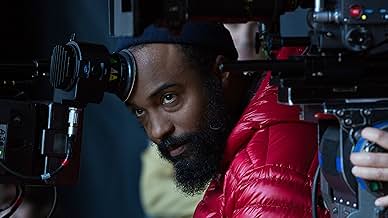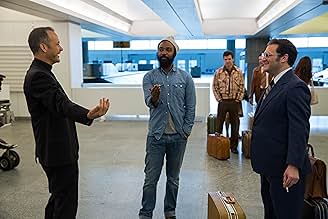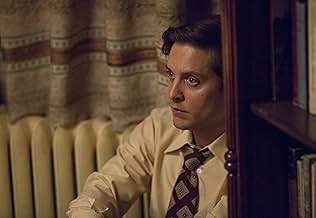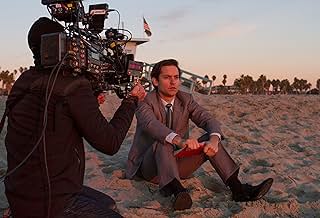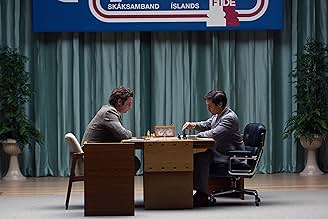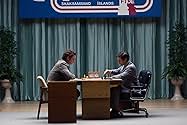AVALIAÇÃO DA IMDb
7,0/10
52 mil
SUA AVALIAÇÃO
Ambientado durante a Guerra Fria, o prodígio do xadrez americano Bobby Fischer se vê preso entre duas superpotências e suas próprias lutas enquanto desafia o Império Soviético.Ambientado durante a Guerra Fria, o prodígio do xadrez americano Bobby Fischer se vê preso entre duas superpotências e suas próprias lutas enquanto desafia o Império Soviético.Ambientado durante a Guerra Fria, o prodígio do xadrez americano Bobby Fischer se vê preso entre duas superpotências e suas próprias lutas enquanto desafia o Império Soviético.
- Direção
- Roteiristas
- Artistas
- Prêmios
- 1 vitória e 1 indicação no total
Shawn Campbell
- Cyril
- (as Shawn Cambell)
Avaliações em destaque
Was hesitant to watch this - didn't like the casting of Maguire as Fischer. Ended up watching it anyway out of curiosity as this story has intrigued me for many years. I still think Maguire was the wrong choice to play Fischer. I would like to have seen Ryan Gosling or a younger Josh Lucas attempt it. At least somebody who could carry off that particular New York accent as that was one of his hallmarks for me. But that notwithstanding, if Tobey was the only choice available then I think he did a hell of a good job. I really enjoyed this. Edward Zwick knows how to put a movie together. Great supporting performances from Sarsgaard, Stuhlbarg and Schreiber. Having followed the story before I got the general impression they were trying to remain faithful to what happened at the chess championship in '72. I'm not sure how much of the mental illness stuff I buy. Clearly there was some kind of paranoia going on there - and the film deals with that well - but I think a lot is projected onto this after the fact. Secondary gains. A lot is conveniently bundled into the mental illness bucket which may just have just been the man's world view. And I think that is disrespectful to a brilliant man who is no longer here to defend himself. But that's not so much a criticism of the film as the general view of Fischer out there now. That said, I think this particular film probably handled it more respectfully than most would have done. So overall it was a lot better than expected. Definitely worth a watch - it's an extraordinary real life story about the extremes of obsession required to compete at that level, and the toll that it can, and often does, take. A subject not too often tackled in a world that worships competition for prizes.
Pawn Sacrifice gets to dramatize the real-life story of Bobby Fischer (Tobey Maguire), Cold War-era chess prodigy and champion. In a clear attempt at prestige candidacy, the film falls victim to the usual biopic pitfall by relying solely on the events as they played out, as opposed to using them to determine a story worth telling. Maybe a bit too long but certainly worth it
Greetings again from the darkness. Being such a fan of the expert documentary film BOBBY FISCHER AGAINST THE WORLD (2011), I found it a bit challenging to clear my head and accept a dramatized approach to the story. This was after all, one of the most fascinating reluctant public figure during one of the most energizing signature events of the Cold War between Russia and the United States
it was even described as World War III on a chess board.
Director Edward Zwick (Glory, Blood Diamond) and writer Steven Knight (Locke, "Peaky Blinders") wisely focus the story on the infamous World Chess Championship match in 1972 between American Bobby Fischer and Russian Boris Spassky. This was 8 years prior to the "Miracle on Ice" when the USA Olympic hockey team upset the powerhouse Russian hockey team, but this chess match caused every bit as much media frenzy and national pride as that day in Lake Placid. This international attention is as important to the story as the psychological state of Bobby Fischer and his genius-level chess skill. And it's the media and citizenry reactions that provide the contemporary comparison to what we see too often these days thanks to social media icons are born, chewed up, and forgotten.
Tobey Maguire plays Fischer, and despite lacking the height and physical presence of the real chess champion, he expertly conveys the paranoia, fear, and arrogance that burdened the man and created even more suspense for those of us keeping a watchful eye at the time. Liev Schreiber ("Ray Donovan") plays Boris Spassky, and even speaks his lines in Russian. Schreiber captures the iciness for which the Russians were known, but also interjects subtle personality and insight in a story where his adversary is constantly over-the-top. Chess strategy isn't so much the story here, as are these two men from different worlds forced together on a stage in Iceland – with the full attention of the world.
Supporting work is varied, but exceptionally strong. Robin Weigert plays Bobby's mother, and we get glimpses of why he later suffered from Mommy issues – in no small part to her intimate gatherings of Communist friends. Lily Rabe is touching as Bobby's sister and possibly the only person who ever had his best interest at heart. However, the real intrigue comes in the form of Peter Sarsgaard as Father Bill Lombardy, and Michael Stuhlbarg as Paul Marshall. Lombardy was Fischer's coach and confidant, and seemed to be the only one who grasped the severity of Bobby's mental state. Marshall, a well known attorney in the Music industry, is a shady fellow who seems connected to the government, and is really the driving force behind getting Fischer to play Spassky. More background and the motivation for these two gentlemen would have been welcome and filled a gap.
The story of the tortured genius always makes entertaining fodder – think Van Gogh, Mozart, and John Nash. Bobby Fischer certainly fits that description, but his story is frustrating because we just don't understand the mental issues that caused him to evolve from teenage chess prodigy to World Champion to literal anti-social outcast spewing hateful words (watch the end credit film clips). This film is a worthy primer for the man and the times, and a reminder that we are always searching for the next hero the next person to hoist up on the pedestal, only to be replaced soon after with another, and then another. Perhaps the film says as much as about us as a people, as it does about Bobby Fischer as a person.
Director Edward Zwick (Glory, Blood Diamond) and writer Steven Knight (Locke, "Peaky Blinders") wisely focus the story on the infamous World Chess Championship match in 1972 between American Bobby Fischer and Russian Boris Spassky. This was 8 years prior to the "Miracle on Ice" when the USA Olympic hockey team upset the powerhouse Russian hockey team, but this chess match caused every bit as much media frenzy and national pride as that day in Lake Placid. This international attention is as important to the story as the psychological state of Bobby Fischer and his genius-level chess skill. And it's the media and citizenry reactions that provide the contemporary comparison to what we see too often these days thanks to social media icons are born, chewed up, and forgotten.
Tobey Maguire plays Fischer, and despite lacking the height and physical presence of the real chess champion, he expertly conveys the paranoia, fear, and arrogance that burdened the man and created even more suspense for those of us keeping a watchful eye at the time. Liev Schreiber ("Ray Donovan") plays Boris Spassky, and even speaks his lines in Russian. Schreiber captures the iciness for which the Russians were known, but also interjects subtle personality and insight in a story where his adversary is constantly over-the-top. Chess strategy isn't so much the story here, as are these two men from different worlds forced together on a stage in Iceland – with the full attention of the world.
Supporting work is varied, but exceptionally strong. Robin Weigert plays Bobby's mother, and we get glimpses of why he later suffered from Mommy issues – in no small part to her intimate gatherings of Communist friends. Lily Rabe is touching as Bobby's sister and possibly the only person who ever had his best interest at heart. However, the real intrigue comes in the form of Peter Sarsgaard as Father Bill Lombardy, and Michael Stuhlbarg as Paul Marshall. Lombardy was Fischer's coach and confidant, and seemed to be the only one who grasped the severity of Bobby's mental state. Marshall, a well known attorney in the Music industry, is a shady fellow who seems connected to the government, and is really the driving force behind getting Fischer to play Spassky. More background and the motivation for these two gentlemen would have been welcome and filled a gap.
The story of the tortured genius always makes entertaining fodder – think Van Gogh, Mozart, and John Nash. Bobby Fischer certainly fits that description, but his story is frustrating because we just don't understand the mental issues that caused him to evolve from teenage chess prodigy to World Champion to literal anti-social outcast spewing hateful words (watch the end credit film clips). This film is a worthy primer for the man and the times, and a reminder that we are always searching for the next hero the next person to hoist up on the pedestal, only to be replaced soon after with another, and then another. Perhaps the film says as much as about us as a people, as it does about Bobby Fischer as a person.
When I was a kid, Bobby Fischer was a big deal. He was a brilliant chess player known for his eccentricities. And I was perplexed as to how chess had become a big deal.
Turns out it was another cold war proxy fight in which the U.S. and Russia were trying to prove their inherent superiority. This was not Bobby Fischer's idea; he just wanted to be a chess champ. In the movie, he's fairly oblivious to the tides of history, at least until he gets caught up in paranoid theories.
This is a very interesting movie with a terrific performance by Tobey Maguire that manages to make chess riveting even if, like me, you have to real idea what's going on. The story it tells is clear and concise, as a mercurial Fischer descends into paranoia while those around him push him forward at any cost.
In fact, the story is a little too neat. The movie feels very much like the movie you'd expect to see if you remember Bobby's weird demands and celebrity. But usually life is a little more complicated than a movie. Reading about Fischer on wikipedia, I saw things that didn't fit in with the movie's view. For example, Fischer was unusually athletic for a chess player, working out regularly during the World Championship, and his love life went beyond hooking up with a prostitute; he later married, which is hard to imagine of Maguire's version.
Still, this is a fascinating, well paced movie that is constantly engaging. This is one of these movies, like All the President's Men, that has figured out how to bring intense drama to hard work and tedious thoroughness.
It also makes me wish I'd actually read some of those chess books my dad bought me; I always just sort of stumbled through without ever understanding the complexities of the game.
Turns out it was another cold war proxy fight in which the U.S. and Russia were trying to prove their inherent superiority. This was not Bobby Fischer's idea; he just wanted to be a chess champ. In the movie, he's fairly oblivious to the tides of history, at least until he gets caught up in paranoid theories.
This is a very interesting movie with a terrific performance by Tobey Maguire that manages to make chess riveting even if, like me, you have to real idea what's going on. The story it tells is clear and concise, as a mercurial Fischer descends into paranoia while those around him push him forward at any cost.
In fact, the story is a little too neat. The movie feels very much like the movie you'd expect to see if you remember Bobby's weird demands and celebrity. But usually life is a little more complicated than a movie. Reading about Fischer on wikipedia, I saw things that didn't fit in with the movie's view. For example, Fischer was unusually athletic for a chess player, working out regularly during the World Championship, and his love life went beyond hooking up with a prostitute; he later married, which is hard to imagine of Maguire's version.
Still, this is a fascinating, well paced movie that is constantly engaging. This is one of these movies, like All the President's Men, that has figured out how to bring intense drama to hard work and tedious thoroughness.
It also makes me wish I'd actually read some of those chess books my dad bought me; I always just sort of stumbled through without ever understanding the complexities of the game.
This is a nice vehicle for Tobey Maguire who does a good job of portraying a paranoid schizophrenic, but that person is not Robert James Fischer. They got Maguire's hair style right but otherwise any resemblance between the tall, lanky, expansive Bobby Fischer and Maguire is slight. He probably didn't see enough footage of Fischer at that age. He didn't use any of Fischer's mannerisms that I noticed and of course Fischer was several inches taller. Liev Schreiber who played Spassky actually looks a bit like Spassky but is bigger and more robust. So we have in the movie Fischer vs. Spassky at the chess board but Spassky bigger than Fischer! As for games mentioned in some detail I had to go back to the first and sixth games of the match to recall what happened and to compare my perception with that of the commentary in the movie. The sixth game was a brilliant game as almost everybody agrees, but contrary to some popular opinion Fischer did not blunder away his bishop in game one. He and Spassky were in a clearly drawn bishop and pawn ending. He wanted more, but there was nothing he could do, so what he did was sacrifice his bishop for two pawns, not as some people think in an attempt to win the game but to show his confidence and to shake Spassky up a bit. Fischer thought the resulting position after many moves would be a draw. He was wrong but this is an example of Fischer psychology: I will make you play a hundred moves if necessary just to show you how strong I am. You will weaken not me.
Some reviewers pointed out some chessic type errors but there weren't that many and they were minor. Here's one they got right that may surprise some people. Notice that Fischer used the descriptive notation ("P-K4") while most other grandmasters even back in 1972 used algebraic notation ("e4"). And while there were chess clock on analyst boards where they serve no purpose at least the boards were set up right with the white square at the player's right hand, avoiding a common error in movies.
Probably the biggest error had nothing to do with chess but with the fact that Fischer's mental illness at the time of the Spassky match had not developed as much as the movie suggests. His personality was more rounded than displayed. He actually had a charming side. People liked him in spite his bad manners and selfishness. There's a YouTube video of him on TV with Bob Hope filmed sometime shortly after the match with Spassky that shows a very different Fischer than the one Maguire portrayed.
The bit with the girl (sarcastically she says to Fischer: "it was good for me too" as he studies a chess game in bed) was apparently director Edward Zwick's take on the nagging question of Fischer's sexuality, meaning yes he was heterosexual, but chess was just more interesting.
The real disappointment for me was that they did not make clear the really great triumphant of Fischer's preceding the championship match. He destroyed three of the top grandmasters en route to the title match, at one point winning 20 games in a row. Amazing. The greatest streak in grandmaster history. So he was a clear favorite although Spassky was the World Champion. That's why he wanted so much to win the first game and confirm immediately that he was clearly superior.
I was also disappointed that Fischer's life after winning the championship was not explored. I had hoped for a cinematic take on what happened to "The Wandering King" (the title of a book about his life by Hans Bohm and Kees Jongkind). Perhaps that material would be better presented in a documentary than in a popular flick.
Bottom line: worth seeing but not as good as I had hoped.
--Dennis Littrell, author of "The World Is Not as We Think It Is"
Some reviewers pointed out some chessic type errors but there weren't that many and they were minor. Here's one they got right that may surprise some people. Notice that Fischer used the descriptive notation ("P-K4") while most other grandmasters even back in 1972 used algebraic notation ("e4"). And while there were chess clock on analyst boards where they serve no purpose at least the boards were set up right with the white square at the player's right hand, avoiding a common error in movies.
Probably the biggest error had nothing to do with chess but with the fact that Fischer's mental illness at the time of the Spassky match had not developed as much as the movie suggests. His personality was more rounded than displayed. He actually had a charming side. People liked him in spite his bad manners and selfishness. There's a YouTube video of him on TV with Bob Hope filmed sometime shortly after the match with Spassky that shows a very different Fischer than the one Maguire portrayed.
The bit with the girl (sarcastically she says to Fischer: "it was good for me too" as he studies a chess game in bed) was apparently director Edward Zwick's take on the nagging question of Fischer's sexuality, meaning yes he was heterosexual, but chess was just more interesting.
The real disappointment for me was that they did not make clear the really great triumphant of Fischer's preceding the championship match. He destroyed three of the top grandmasters en route to the title match, at one point winning 20 games in a row. Amazing. The greatest streak in grandmaster history. So he was a clear favorite although Spassky was the World Champion. That's why he wanted so much to win the first game and confirm immediately that he was clearly superior.
I was also disappointed that Fischer's life after winning the championship was not explored. I had hoped for a cinematic take on what happened to "The Wandering King" (the title of a book about his life by Hans Bohm and Kees Jongkind). Perhaps that material would be better presented in a documentary than in a popular flick.
Bottom line: worth seeing but not as good as I had hoped.
--Dennis Littrell, author of "The World Is Not as We Think It Is"
Você sabia?
- CuriosidadesBobby Fischer was wanted in the United States of America for violating economic sanctions against the former Yugoslavia by playing a chess match there in 1992. He fled to Japan and was arrested in July 2004 for trying to leave Japan on a revoked U.S. passport. Thus, he was detained in Japan awaiting deportation to the USA. He renounced his U.S. citizenship and tried to become a German citizen, but was denied. Finally, in March 2005, Iceland's parliament voted to grant him Icelandic citizenship. He remained a fugitive from the USA until his death.
- Erros de gravaçãoWhen Fischer first meets Boris Spassky in Santa Monica in 1966 Boris is introduced as the World Champion. Boris was not yet the World Champion. Tigran Petrosian was the World Chess Champion at that time.
- Citações
Paul Marshall: I think he's afraid of what's gonna happen if he loses.
Father Bill Lombardy: No, he's afraid of what's gonna happen if he wins.
- Cenas durante ou pós-créditosIn the closing credits, the name of the character Cyril (played by Shawn Campbell) is misspelled "Cryil."
- ConexõesFeatured in Bobby Fischer, The Cold War and the Match of the Century (2015)
- Trilhas sonorasAlong Came Betty
Written by Benny Golson
Performed by Art Blakey and The Jazz Messengers
Courtesy of Concord Music Group, Inc.
By Arrangement with Time Step Music
Principais escolhas
Faça login para avaliar e ver a lista de recomendações personalizadas
Detalhes
- Data de lançamento
- País de origem
- Centrais de atendimento oficiais
- Idiomas
- Também conhecido como
- La jugada maestra
- Locações de filme
- Empresas de produção
- Consulte mais créditos da empresa na IMDbPro
Bilheteria
- Orçamento
- US$ 19.000.000 (estimativa)
- Faturamento bruto nos EUA e Canadá
- US$ 2.436.633
- Fim de semana de estreia nos EUA e Canadá
- US$ 202.053
- 20 de set. de 2015
- Faturamento bruto mundial
- US$ 5.578.519
- Tempo de duração1 hora 55 minutos
- Cor
- Proporção
- 2.35 : 1
Contribua para esta página
Sugerir uma alteração ou adicionar conteúdo ausente








